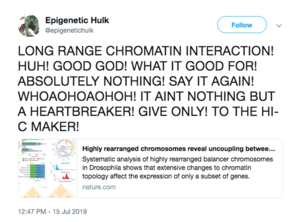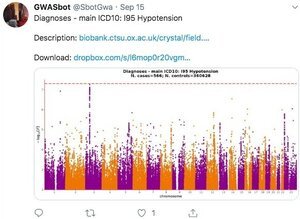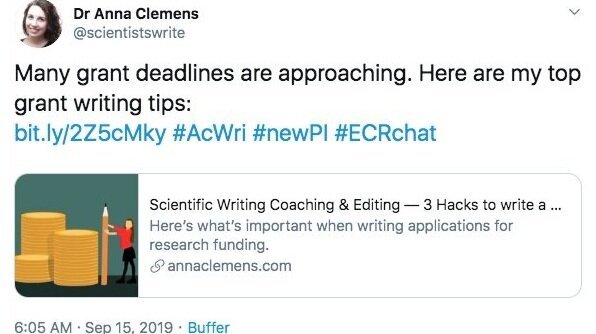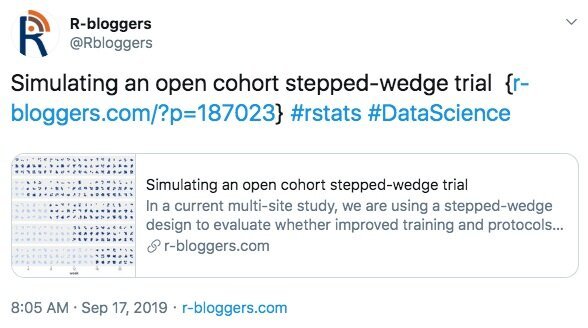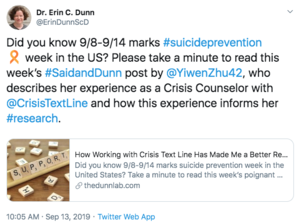A Look Into the Weird and Wonderful World of Academic Twitter
From my perspective as a post-doctoral student, the use of Twitter in academia is a little bit of a controversial topic – is it really as good of a resource as my advisors say or is it going to be a time-waster for my already limited time?
After years of resisting the insistence of my mentors to join the ‘Academic Twitter’ community, I finally caved a few months ago and made my own account, which you can find at @alussier17.
Academic Twitter is an interesting place to say the least, but it is a great resource to stay up to date on new papers, funding and job opportunities, academic drama, and so much more. Even better, it is a great way to connect with other academics around the world.
Now, let’s be clear: I am not a good example of being active on Twitter. I’m still testing the waters, mostly retweeting or liking things I think are interesting or important. For now, I am content to lurk on the edges, follow a few new people every day, retweet interesting papers or articles, and only make it a short, semi-relaxing part of my day. I’ll eventually have to bite the bullet and start putting out some original content of my own, but that’s a job for future me.
But in the meantime, I’d love to use this Said&Dunn post to share some of my favorite people and posts on Twitter.
Let’s start with the fun stuff and work our way down:
@epigenetichulk – EPIGENETIC HULK SMASH EPIGENETIC PAPERS. This account shares summaries of interesting epigenetics papers in a very ‘hulk-like’ manner’.
@GWASbot – A self-described bot that loves Manhattan plots, this little guy produces a Manhattan plot of a random phenotype from @uk_biobank data every day. This account helps give some insight into the fact that you can find a GWAS signal in almost everything… which is scary to say the least.
@scientistswrite – Dr. Anna Clemens, a scientific editor and science writer, give fantastic advice about writing papers and proposals. I highly recommend following her and reading her blog, particularly this new recent article on what not to do when writing a manuscript.
@RBloggers – This account tweets links to blog posts from the R’blogosphere’ with little synopsis! I’ve found some really cool packages this way – such as ‘wesanderson’, my favorite color palette for figures. Also check out @RLadiesGlobal, which promotes diversity in the #rstats community!
@ScienceDaily – I’ve been using Science Daily since the beginning of grad school for press releases on interesting articles from all fields. It’s fun to read short summaries of articles from fields to which I’m not usually exposed!
@NatureNews – Rule of thumb: it is always good to keep up with the major journals such as @sciencemagazine, @PNASnews, @JAMA_current, @TheLancet, and many more. My Twitter principle is if I regularly see/read good papers from a journal, I try to follow it on Twitter.
@nationalpostdoc – The national postdoctoral association is a great resource to find valuable information. I try to follow a bunch of these types of organizations to stay informed of fellowships and different opportunities for growth.
@harvardmed – I mean, I may have a bit of a bias here, but it’s good to keep up with your affiliate institutes! What if your office mate published a paper, but too humble or shy to tell you? Twitter might tell you and then you can surprise them with bubbly apple juice 🍾. On a related note, I also try to follow lots of departments and universities where I’d like to possibly work someday. It’s nice to keep a finger on the pulse of their research and keep an eye out for job postings (not that I’m looking @ErinDunnScD… I don’t think I can handle moving again for a while…)
@ErinDunnScD – Is trying to get more people to follow your PI brown-nosing? Maybe…. but you should totally check out her Twitter – job postings, fun tweets, blog posts galore, and all the amazing things our lab members are doing! (They can be found at @RVMountain, @YiwenZhu42, @karmelchoi, @Liv_Pickett, @JanineCerutti, and @SternsOlivia). Otherwise, I’m slowly trying to follow other academics when I see something interesting they’ve published/tweeted/etc. Sometimes they even follow me back!
Thankfully, not all academic twitter is serious: here are some my highlights.
@popgengoogling – The hunt is still on to figure out who owns this account, but in the meantime, it is, in my opinion, one of the most enjoyable accounts on Twitter. It is self-described as sharing ‘real google searches from population genetics grad students who are definitely real people’. If these make you laugh, check out @botgengoogling as well, which uses machine learning trained on @popgengoogling for its own tweets.
@GooglingBioinfo – It hurts, but it’s the truth. It helps to have a good laugh about the hardships that are academia.
@legogradstudent – Captures the essence of academia in a Lego scene. Doesn’t post as much as it used to, but I think the owner is no longer an actual grad student (congrats!). Still, amazing tweets that never fail to make me laugh.
@redpenblackpen – great comics about academia. It’s nice knowing that everyone goes through mostly the same experience.
I also follow non-work related accounts to make me feel warm and fuzzy sometimes…
@dog_rates – Cute dogs ✅, fun captions ✅, feeling better after a long day ✅. A perfect 13/10.
@evilbmcats –Maybe cats are more your thing because they capture the inner darkness and cynicism of your soul. I get it. That’s how I feel during early meetings without coffee. This account is called ‘Black Metal Cats’ to give just a bit more context.
@MbtaWar – Since moving to Boston, I have especially learned one thing: the T breaks down a lot. Thankfully we have ‘Civil War MBTA’ to cheer us up with their Civil War themed memes.
So in the end, I guess I’m a little more active on Twitter than I originally let on… it can definitely be a time sink, but if you gradually start following and retweeting, it will seem less like a chore and more like an opportunity to interact with your peers without having to actually talk to them #introvertsunite #separately #inyourownhomes.
I hope this was a helpful and interesting snapshot into my view and use of the Twitterverse. If you have you own recommendations, feel free to share them with me @alussier17 and the Dunn Lab!

